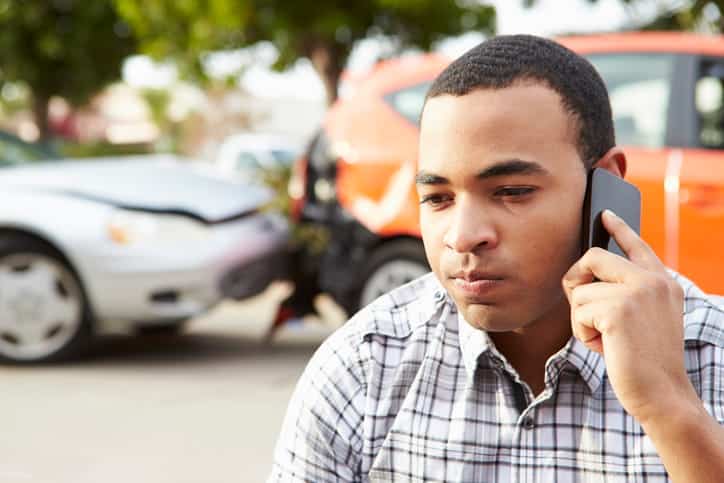Also called no-fault insurance, personal injury protection (PIP) coverage covers medical expenses, lost wages, and other damages for you and your passengers when involved in a car accident, regardless of fault. This coverage can protect you significantly when filing a third-party claim is not an option.
Contact Adam S. Kutner, Injury Attorneys, to learn more about how PIP coverage can protect you and your loved ones.
GET YOUR FREE CAR ACCIDENT CONSULTATION
NO FEES UNLESS WE WIN!
Personal Injury Protection Coverage

Insurance companies offer PIP coverage to protect policyholders when they are involved in a car accident. It protects drivers, passengers, and pedestrians.
While drivers must have auto insurance, PIP is optional in most states. Nonetheless, it’s vital to have this type of insurance, as it ensures you are always protected when on the road, even when you are partially or fully liable for a crash.
What Is Personal Injury Protection?
Personal injury protection is a type of insurance coverage that protects policyholders and their passengers, including those who don’t have health insurance, when involved in an accident. The damages it covers depend on the state, but generally, it covers medical bills, lost wages, household services, disability and rehab costs, and funeral expenses.
If a policyholder is involved in an accident with an uninsured or underinsured driver, they can use personal injury protection to cover their damages. This coverage is also an option when a policyholder is involved in a hit-and-run accident.
How Does PIP Insurance/No-Fault Insurance Claims Work?
When a policyholder is injured, they need to file a personal injury protection claim with their own insurance company. To do this, they should first contact the insurer to notify them of the accident.
After the insurer initiates the claim, the policyholder should send documentation of the accident-related costs they incurred. These include receipts of medical bills, documentation from their employer showing their missed work (where they were not paid), detailed records of payment to another person to help with household services, medical documentation stating they need disability benefits or rehabilitation, and so on.
The insurer will then assess the claim and the expenses incurred and then cover the policyholder to a specified limit. For example, in Massachusetts, the minimum limit for PIP is $8,000. If you suffer damages that amount to $8,000 or below, PIP will cover all your damages. However, if your damages are more than $8,000, you may need to consider other options.
Kansas does not have a set maximum coverage limit for PIP, but the minimum is $4,500 for medical expenses, $900 per month for lost wages (for one year), $900 per month for disability and/or loss of income (for one year), $25 per day for in-home services (for one year), $2,000 for funeral, burial or cremation expense, and $4,500 for occupational rehabilitation.
It can be wise to purchase a plan with more coverage so you don’t reach your limit before fully recovering.
What Does Personal Injury Protection Cover?
PIP covers many damages that are typically not covered by other types of insurance. Here is what PIP covers:
Medical Expenses
PIP covers medical expenses, including ambulance rides, hospital stays, diagnostic services, treatment, surgery costs, nursing care, rehabilitation, medication, medical supplies, follow-up visits, transportation to and from appointments, and ongoing care.
Work Loss
The injuries you sustain in a car accident may make it impossible for you to work. You may need to miss work for some time to recover. PIP coverage will cover the income you would have earned during this time.
If you earn an hourly wage of $20 per hour and miss 30 hours, PIP should pay you $600 in lost wages.
If you earn an annual salary of $40,000 and miss three work days, divide your salary by the number of working hours in a year (2,080 hours). 40,000 divided by 2,080 equals $19.231 (which is your daily rate). If you miss three days of work, you missed 24 hours (three days multiplied by eight hours). $19.231 multiplied by 24 is $461.54. This is your total lost wages.
Funeral Expenses
If a car accident results in a death, PIP coverage will cover funeral expenses, including burial costs and cremation fees.
Survivors’ Loss
PIP coverage can replace the income of the deceased, providing support to the deceased’s dependents. This ensures the dependents can meet their daily needs.
Household Services
When injured, you may be unable to provide care to your children if you have any — you may be unable to prepare meals or do laundry for them. Your injury may also make it impossible to care for your pet, clean the house, or mow your lawn. Accordingly, you will need to hire someone to come and help you with these tasks. Luckily, PIP coverage covers household services.
Disability And Rehab Costs
If you develop a disability as a result of an accident, PIP coverage will cover expenses related to the disability and any necessary rehabilitation costs.
What Is Not Covered By Pip Insurance?
Some damages you suffer following a car accident will not be covered by PIP insurance. You will need to use another type of insurance to cover these damages. They include:
Damage To Your Vehicle
PIP insurance does not cover damage to vehicles, as its primary purpose is to cover medical bills, lost wages, and other related costs incurred by a driver and their passengers and pedestrians. To cover car repair or replacement costs in the event of an accident, you need to purchase another plan from your insurer.
Theft Of Your Vehicle
PIP insurance does not cover vehicle theft. Adding comprehensive coverage to your auto coverage policy will ensure you are protected from non-accident-related costs, such as theft and vandalism.
Damage To Someone’s Property
PIP insurance does not cover property damage, including property belonging to the policyholder or someone else.
Other Drivers’ Injuries
PIP insurance covers a policyholder and their passengers. It does not cover injuries sustained by other drivers involved in a car accident.
Accident When Committing A Crime
If a policyholder gets injured in a car accident when engaging in an illegal activity, PIP insurance will not cover the damages they suffer.
If Received Payment For Driving
PIP insurance may not cover those who receive payment for driving if an accident happens while operating the vehicle.
How Can I Select The Right Amount Of Personal Injury Protection Coverage?
It’s crucial to select the right amount of PIP coverage. A few tips can help you determine the most appropriate amount.
If your health insurance adequately covers you, carrying the minimum amount of PIP required by your state can work.
However, if you are the primary provider of your household, it is best to have higher PIP coverage. This way, if you are involved in a car accident, you can continue providing for your family until you are fully recovered to return to work.
Another factor to consider is your occupation. Consider a higher policy limit if you work in an industry that puts you at a high risk for auto accidents. You should also consider if you frequently drive in high-traffic areas, always have long commutes, or are passionate about road trips.
Pay attention to your daily habits, income, and health insurance adequacy to determine the right amount of PIP coverage.
Personal Injury Protection (PIP) VS. Liability Insurance
While PIP insurance covers a policyholder and their passengers injured in a car accident, liability insurance covers the injuries of other people when the policyholder is found at fault in an accident. Liability coverage can cover bodily injuries and property damage.
Thus, the main difference between PIP and liability insurance is the party that benefits from the coverage.
Personal Injury Protection Car Insurance Requirements By State
PIP car insurance requirements differ by state. You need to understand the guidelines of your state to determine whether or not you need one and how this type of insurance can substantially protect you.
No-Fault States
Some no-fault states where drivers carry PIP include:
- Delaware
- Florida
- Hawaii
- Kansas
- Kentucky
- Massachusetts
- Michigan
- Minnesota
- New Jersey
- New York
- North Dakota
- Pennsylvania
- Utah
At-Fault States Where PIP Is Required
Some at-fault states where PIP is required are:
- Arkansas
- Delaware
- Oregon
- Maryland
At-Fault States Where PIP Is Optional
Some at-fault states where PIP is optional are:
- Nevada
- New Hampshire
- South Dakota
- Texas
- Washington
- Washington D.C.
How Adam S. Kutner Can Help In A Personal Injury Protection Coverage Claim
If you are involved in a car accident, it’s crucial to understand how you can be protected by your personal injury protection coverage. Adam S. Kutner, Injury Attorneys, has a team of experienced car accident attorneys who can help you build a strong claim to maximize the compensation you receive from your insurance company.
Call (702) 382-0000 For a Free Consultation
FAQ
Do I Need Pip Coverage If I Have Health Insurance?
It depends on your state’s requirements. If your state requires you to carry PIP coverage, you will need to purchase a plan even if you have health insurance. If it’s optional to have PIP in your state, you may not need it in addition to your health insurance, but it’s critical to have it.
Is Pip Coverage The Same As Bodily Injury Coverage?
No. PIP insurance covers the policyholder and their pedestrians when involved in an accident, while bodily injury coverage covers the damages to other people.
Areas We Service in Las Vegas, Nevada
Henderson | Anthem | Summerlin | Paradise | Summerlin North | Summerlin South | Sunrise Manor | Nellis AFB | Desert Shores | Downtown South | Charleston | Richfield | Crestwood | Angel Park Ranch | Queensridge | Casa Grande Pines | Winchester |
Adam S. Kutner reviews and testimonials
“We were in a car accident – we were coming off of the interstate and were waiting – yielding at the exit and a car sped through the exit and smacked us in the rear.
It was definitely scary especially because we had our baby in the car. My husband and I and our baby in the back seat. We definitely – immediately went back in and checked on her to make sure she was okay.
We definitely had back pains my daughter had headaches. She kept holding her head and crying. It was pretty bad. I remember seeing a couple billboards and a friend of mine did say they had a pleasant experience with Adam Kutner, so we called them right up. They definitely were thorough, and you could tell just by talking to the people in the office that they genuinely cared about their clients.
They contacted us saying you know, explain the process on how the settlement gets done and about a week after that happened we had our settlement which was great and in my opinion Adam S. Kutner is the best attorney in Las Vegas.”
– Janae Reynolds. 5/5 Stars
START YOUR FREE CONSULTATION
NO FEES UNLESS WE WIN!
SE HABLA ESPAÑOL
Call Now! Free Consultation!

Adam S. Kutner
PERSONAL INJURY LAWYER
With more than 34 years of experience fighting for victims of personal injury in the Las Vegas Valley, attorney Adam S. Kutner knows his way around the Nevada court system and how to get clients their settlement promptly and trouble-free.












